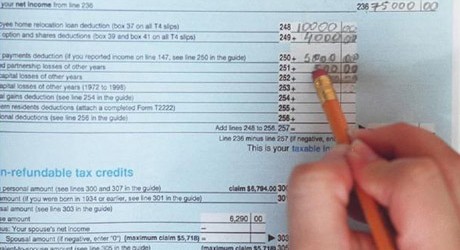
Tax tips for people with dementia and their caregivers
Although it doesn’t seem like spring, one of its important deadlines has come all the same: tax time. To help you with the process, we’ve assembled a basic list of tax benefits available for people with Alzheimer’s disease and other dementias.
The first step of your tax strategy is to procure the T2201 disability tax credit certificate from the Canada Revenue Agency website. This will entitle whoever has Alzheimer’s disease or another dementia to a tax credit. It must be filled out by a medical professional and filed as a hard copy during the first year of your claim. The document is also important for claiming other tax benefits for someone with a disability and those caring for them. Read our in-depth blog post further outlining the credit and how you can maximize your benefit from it.
This credit, along with others mentioned below, is a non-refundable tax credit. Once such credits have reduced your taxation rate to zero, you won’t derive any benefits from them this year. Some of these credits are transferable; any relative or spouse upon whom the person with Alzheimer’s disease is dependent can file these credits and reap those tax benefits.
There are two other important tax credits, but for caregivers rather than people with the disease: the eligible dependent and the caregiver credit. Both can be claimed if so long as either have not been by another person. The caregiver credit has also been increased for family members in that role by $2,000 in the 2012 federal budget. Read more about tax benefits for caregivers.
Claims against money spent can also be made. Many medical expenses are deducted as a non-refundable tax credit. These expenses must add up to 3% of total income or $2,100, whichever is less, in order for the person to qualify:
- payments to a medical doctor, dentist, nurse, or certain other medical professionals or to a public or licensed private hospital
- premiums paid to private health services plans
- premiums paid under a provincial or territorial prescription drug plan
- payments for artificial limbs, wheelchairs, crutches, hearing aids, prescription eyeglasses or contact lenses, dentures, pacemakers, prescription drugs, and certain prescription medical devices
Costs for the following attendant care are also included, such as:
- food preparation
- housekeeping services for a resident’s personal living space
- laundry services for a resident’s personal items
- health care (registered nurse, practical nurse, certified health care aide, personal support worker)
- activities (social programmer);
Travel expenses required for treatment may also be covered if the following conditions are met:
- A medical service is not available nearby
- If you had to travel at least 40 kilometres (one way) from your home, you may be able to claim the public transportation expenses you paid (taxis, bus, or train). If no public transit was readily available, you may be able to claim vehicle expenses.
- If you have travelled more than 80 kilometres, you may be able to claim accommodation, meal and parking expenses.
It is important to note that this is just a guide; there is much more to filing a tax return than basic arithmetic. It is best to meet with a tax specialist to find an approach that will maximize your benefits and take a long-term view of your finances. Visit our website for more information on financial planning.
